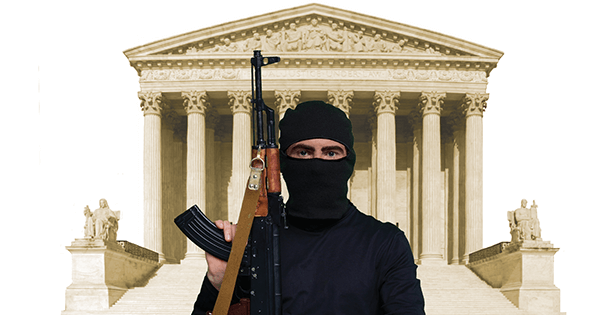Rethinking How We Try Terrorists
How has 9/11 changed the courts and national security?


Karen Greenberg, director of Fordham University School of Law’s Center on National Security, is the author of The Torture Papers and The Least Worst Place. Her new book, Rogue Justice: The Making of the Security State, was published in May. We asked Greenberg to pose several questions about the future of America’s court procedures and constitutional safeguards for combating terrorism.
1. In 1972, the U.S. Supreme Court ruled that FBI and NSA spying on Americans for political purposes was illegal, noting that the collection of foreign intelligence information was possibly not covered by either the Constitution or statute. Thus, in 1978, Congress passed a law aimed at specifying how and under what conditions law enforcement and intelligence agencies could surveil suspected agents of foreign powers in the United States. Known as the Foreign Intelligence Surveillance Act (FISA), it relied on the decisions of federal judges who were appointed to a special FISA Court and made classified decisions about whether the FBI could get a warrant to eavesdrop. For nearly 25 years, that court functioned under the radar, almost never turning down FBI requests for such warrants, and therefore never requiring appeal to the Foreign Intelligence Surveillance Court of Review, the mechanism created for the government to challenge FISA Court decisions. After 9/11, the Court of Review met for the first time to consider broadening the grounds for obtaining these warrants. The court met at least twice, once in 2002 and again in 2008, and both times upheld the FBI’s request for expanded surveillance powers. Unbeknownst to the public, with these powers the Bush administration created policies that, I contend, violated fundamental Fourth Amendment guarantees.
The Edward Snowden revelations in 2013 exposed the breadth and scope of the post-9/11 uses of government surveillance. Two years later, the Patriot Act’s provisions that enabled bulk surveillance ended.
Will all three branches of government continue to hold that secret courts that authorize surveillance in national security investigations are legal, or will at least one branch insist on more transparency, even when national security is at stake?
2. In 2006, Congress passed the Military Commissions Act, which revamped the bare-bones procedures initially issued in 2001 for trying Guantánamo detainees. Three years later, Congress passed the Military Commissions Act of 2009, which revived those commissions under President Obama, making them more akin to federal criminal courts. Yet for seven years, these courts have faced myriad procedural problems. All told, the commissions have led to only eight convictions; three have been overturned, and one is pending a decision before an appellate court. Meanwhile, the 9/11 defendants have not stood trial. In contrast, federal courts have tried more than 500 suspected terrorists since 9/11 and convicted nearly all of them, some for lethal attacks on Americans. The civilian court trials have handled issues of classified evidence, material provided by foreign police investigations, anonymous witnesses, witnesses who have testified by video conference while in foreign custody, and the admissibility of evidence obtained via torture. Will we continue to support military commissions to prosecute terrorists when they have failed to bring even the most tragic act against America to its conclusion? Will Congress be persuaded to discontinue these military commissions and bring the cases back to federal court?
3. Several leading national security lawyers and former government officials have proposed a “national security court” for handling the detention and prosecution of suspected terrorists. These experts envision courts that will be more flexible than current federal criminal courts but not as isolated as military commissions. Pointing to the existence of special courts for matters such as bankruptcy, taxes, and patents, the group argues that trying terrorists requires different evidentiary standards, special leeway for classified materials, a dedicated group of judges and lawyers steeped in the “nuances” of terrorism, and other special requirements. Critics have pointed out that such a court would compromise the high standards and constitutional protections of the American judicial system, that flexibility and competence are already built into the system, and that such reforms could eventually weaken protections for criminal defendants accused of crimes not involving terrorism. Since President Obama took office, the question has receded from public discourse, but a new president may have a different regard for the rules and procedures of the country’s judicial system.
Should America establish a national security court for trying suspected terrorists or for ordering preventive detention of terrorists? Would such a court strengthen or weaken the ability of existing courts and commissions to try terrorists in a timely and just fashion?
4. Hundreds of drone strikes have killed an estimated 5,000 people since 9/11, and President Obama has made targeted killing central to his counterterrorism strategy. The administration regularly meets with top national security advisers to determine which terrorists to target. Some members of Congress, such as independent Sen. Angus King from Maine, believe that allowing the White House to serve as “the prosecutor, the judge, the jury, and the executioner all in one is very contrary to the traditions and the laws of this country.” Some lawyers, legislators, and national security experts have proposed a different process: a secret court, based on the FISA Court model. Opponents of such a court argue it infringes on the president’s commander-in-chief powers, and supporters insist that it is a more legitimate process that the current one, in which all power lies with the executive. Should the United States have a “drone court”? Are drone attacks a matter for the president and the National Security Council to address in secret, or should there be some formalized legislation and legal review of targeted killing decisions?

